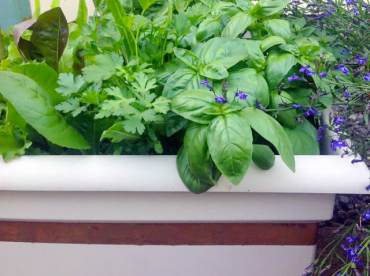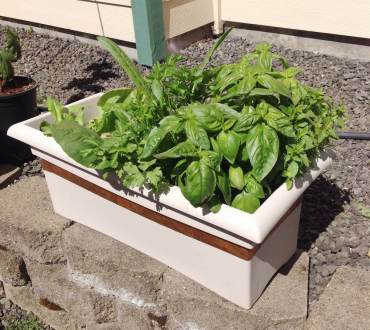 Whether you are new to gardening, live in a townhouse or other small space or are an experienced gardener, you probably have seen a favorite crop in a raised bed or in-ground garden turned into Swiss cheese by the creatures of the night.
Whether you are new to gardening, live in a townhouse or other small space or are an experienced gardener, you probably have seen a favorite crop in a raised bed or in-ground garden turned into Swiss cheese by the creatures of the night.
One solution to this perennial problem has been solved in my garden by using what I have termed “salad boxes.” Most people see the rectangular, plastic containers as flower boxes, but they are easily turned into food-production containers with a slight adaptation.
One-inch-wide copper-foil tape is available at some big-box stores and garden centers for a price of under $10 for a 15-foot roll. I applied it to a very clean and empty container, remembering to surround the drainage holes on the bottom to deter that possible entrance.
I used a potting mix rather than garden soil to fill the container in late May. Garden soil could have unseen slug eggs or other pests and is not recommended for container gardens.
You only need a tiny amount of lettuce and basil seed varieties. Once you have applied the copper-foil tape and filled the box with potting mix, water the entire unit before planting seeds.
 Unlike planting a garden with neat rows of plants, your box should have little space between seeds and future plants. The actual planting is to scatter the seeds and lightly cover with _ inch of additional potting mix. Press down the top of the potting mix to be sure the seeds have good contact with the moist potting mix. This will help with quick germinating.
Unlike planting a garden with neat rows of plants, your box should have little space between seeds and future plants. The actual planting is to scatter the seeds and lightly cover with _ inch of additional potting mix. Press down the top of the potting mix to be sure the seeds have good contact with the moist potting mix. This will help with quick germinating.
The newly forming roots must contact moist potting mix, or they will die. Keep the planted box in an outdoor location where you will see it and be reminded to gently water every day as the seedlings are growing, because containers dry out quickly.
A regularly watered salad garden in a container has been providing us with tender basil and lots of “cut and come again” salads during the entire summer. The key is to harvest the outer lettuce leaves or even cut off the lettuce about one inch above the potting mix and allow the roots to regenerate more leaves.
To keep the plants producing, I use fish-emulsion fertilizer diluted as stated on the bottle. This provides a slight nitrogen boost to the plants after a weekly lettuce cut for two salads.
Last August, I started a box with fresh potting mix and a fall blend of lettuce seeds from Territorial Seed Co. and was able to cut my own homegrown baby lettuce well into the rainy season.























